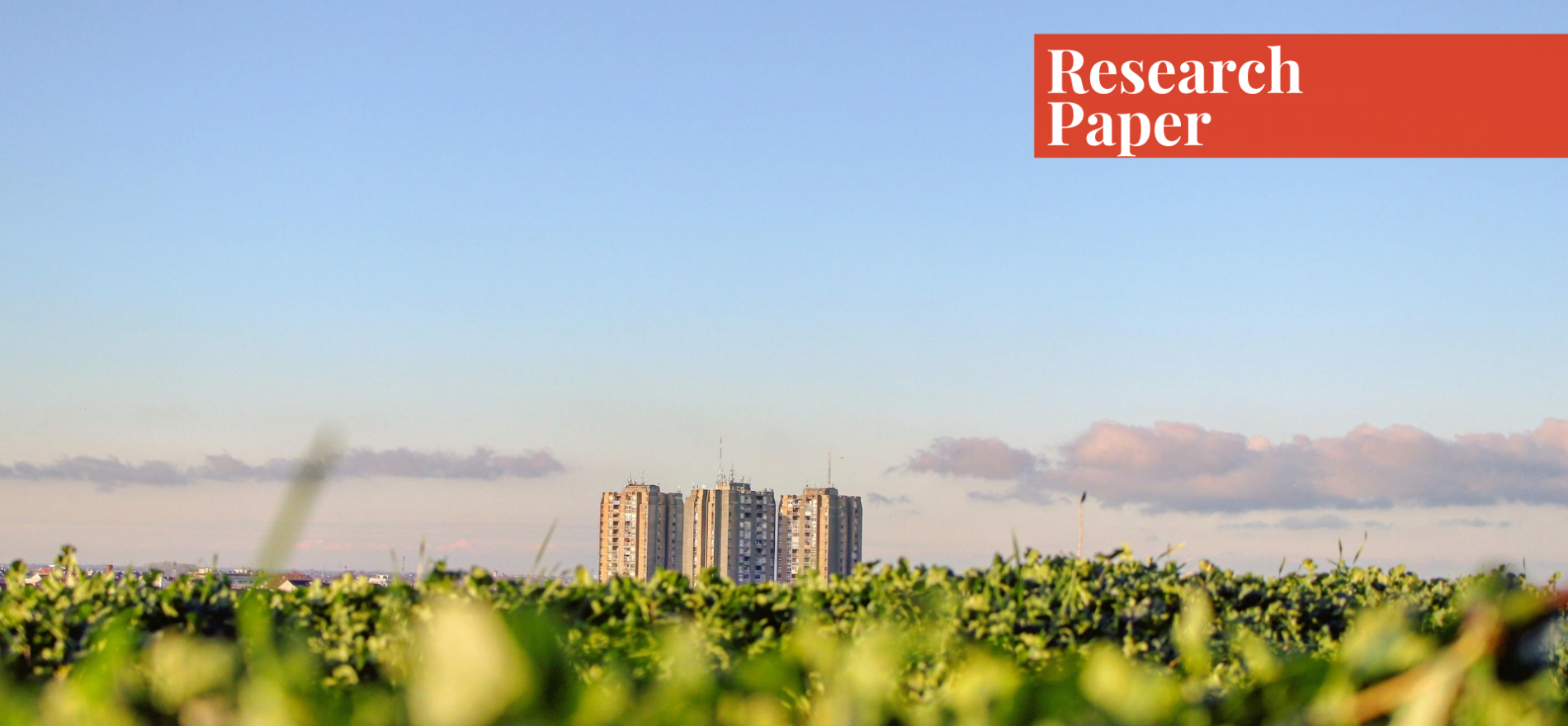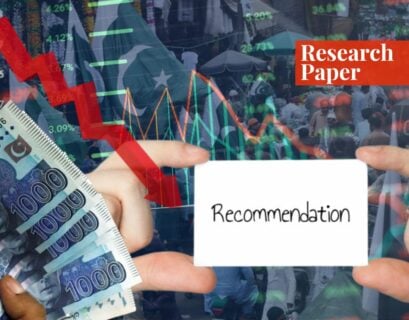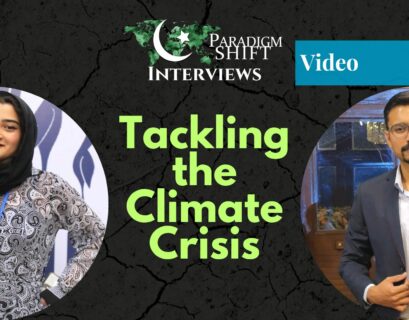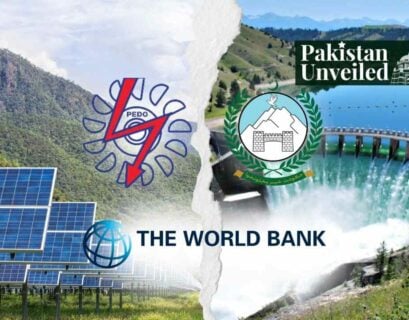Amna Babar is currently working with an NGO in Islamabad. She holds a bachelor's degree in social sciences with major in development studies from Bahria University Islamabad. She is fond of reading fiction and engaging in academic discourse pertaining to social development, women empowerment, environment, and human rights.
Introduction
The notion of sustainable development has evolved; from being limited to an environment protection policy solely focused on making current advances in the environment sector, it now encompasses a broadened perspective of conserving resources for future generations – cutting across the interdependence of social, environmental, and economic spheres.
Sustainable development, today, includes three core components: the concept of development, that is, socio-economic development in line with ecological constraints; the concept of needs that relates to the redistribution of resources to ensure the quality of life for all; and the concept of future generations, that is, the possibility of long-term usage of resources to ensure the necessary quality of life for future generations (Klarin, 2018).
The focus (previously solely on the environment) has now broadened to prioritize improvements in the well-being of the present and future indigent people (Paul, 2008). Culture can be understood as “the customary beliefs, social forms, and material traits of a racial, religious, or social group.” (Merriam-Webster, n.d.). It holds a large stake in shaping who people are, how they live, and the choices they make.
United Nations Educational, Scientific and Cultural Organization (UNESCO) emphasizes the importance of culture for sustainable development, stating that, “No development can be sustainable without including culture” (UNESCO, n.d.). Culture greatly influences people’s behavior and perspectives: it determines what people give value to, and their approaches towards causes and matters.
The role of culture is also recognized through most of the Sustainable Development Goals (SDGs), including those focusing on quality education, sustainable cities, the environment, economic growth, sustainable consumption and production patterns, peaceful and inclusive societies, gender equality, and food security (UNESCO, n.d.).
Culture can be an enabler, yet also pose as a hindrance to sustainable development. On one hand, local and indigenous knowledge systems and environmental management practices may provide valuable insight and tools for tackling ecological challenges, preventing biodiversity loss, reducing land degradation, and mitigating the effects of climate change (Magni, 2016).
On the other hand, they may also include perpetuation of traditional practices, lifestyles, and sources of livelihoods that are deleterious towards a society’s environmental, economic, and social systems. This paper presents a study into each of these roles played by culture in a country’s sustainable development.
Culture as a Hindrance to Sustainable Development
To assess the culture of a country as a barrier to its sustainable development, one must closely analyze the behavioral and living patterns of individuals and how that impacts a country’s broader understanding and approach to development. Discussed below are examples of unsustainable practices adopted by individuals directly influencing a nation’s natural capital, which, in turn, affects the lives of the present and future generations dependent on them for sustenance and growth. Following the Industrial Revolution, higher production rates emerged worldwide causing an increased demand for raw materials.
Greater production led to greater consumption and vice versa, creating a culture of consumerism that fuelled the human use of nearly every natural resource at unsustainable rates (Scultz, 2002). Unfortunately, the rapid growth rate of countries’ economies driven by the consumerist culture not only falls at the cost of depletion of natural reserves but also by heavy pollution in the form of the production of greenhouse gases, the release of chlorofluorocarbons (CFCs), deforestation, poor waste management and so on.
In the United States, the average consumer “produces twice his weight per day in household, hazardous, and industrial waste, and an additional half-ton per week when gaseous wastes such as carbon dioxide are included” (Hawken, 1993, p. 12). Every American consumes about 36 pounds of resources a week, while 2,000 pounds of resources are discarded to support that consumption (Harsch, 1999).
The consumerist culture fostered in urban centers of countries too often fails to consider the sustainability and ecological impact of products and services, directly affecting a country’s effort in achieving sustainable development. Cultural practices are shaped by knowledge and awareness. However, in many areas, these variables rely solely upon tradition and indigenous information passed on through generations, without any external amendment or awareness. These tend to include unsustainable methods that are extremely damaging to the natural environment.
For example, across the world, destructive cultural fishing practices are carried out. In South-East Asia, a traditional fishing technique called “muro-ami” is employed on coral reef ecosystems. The method uses an encircling net together with pounding devices. These devices usually comprise large stones fitted on ropes that are pounded into the coral reefs, intended to scare fish out of the coral reef after shattering it into pieces.
This fishing technique creates broad-reaching destruction to coral reef ecosystems (Greentumble, 2015), which, in the long run, will heavily impact marine ecosystems, human nutrition, and sources of livelihoods. Moreover, culture plays a significant role in shaping the social climate of a country and, in turn, guides the lives of individuals based on race, gender, ethnicity, religion, etcetera. Linking this to sustainable development, one may evaluate how certain social practices, emerging out of culture harm communities in the longer term.
Early or forced marriages, which is any marriage of a child under the age of 18 without their consent, take place globally but are most common in Africa and South Asia, especially among the poorest, most rural communities attributing to culture and tradition. UNICEF estimates that 42% of girls in Africa are married before the age of 18, leading to sexual activity for a girl at an age when she is neither physically nor sexually mature.
Young brides may become pregnant at an early age, increasing their vulnerability to death during childbirth, experiencing obstetric fistula, and poor maternal and natal health (Harmful Traditional Practices Affecting Women And Girls, n.d.). Without intervention and change in culture, such practices continue to affect women and their health, hindering the achievement of Sustainable Development Goals targeting maternal health and achieving gender equality.
Furthermore, cultures upholding social exclusion and marginalization of minority groups in a country often lead to deep deprivation, reducing the communities to a poverty-stricken life and subsequently forcing them to seek out sources of livelihoods or lead lifestyles detrimental to the natural environment. Examples of such income-generating activities may include trash burning, deforestation, destructive fishing techniques, and endangered species hunting, among others.
As mentioned above, a country’s culture also comprises what is and isn’t valued by the population, and inevitably determines the importance people attach to sustainable practices and methods. In Pakistan’s capital, Islamabad, plastic bags have recently been banned to switch to eco-friendly and sustainable cloth bags. However, the shift on part of the city’s population is being protracted due to the many protests against the policy, for the notion of reducing, reusing, and recycling does not resonate with people who are too accustomed to free-of-cost plastic bags and their careless disposal.
The popular culture of the country across rural and urban areas relatively holds lower sensitivity with issues concerning pollution and environmental degradation. Tourist attractions throughout the country are subject to littering and poor waste management, which is not just a reflection of weak governance and law enforcement but also shows a lack of moral conscience on part of the people to protect and conserve the environment through their actions.
Culture Enabling and Contributing to Sustainable Development
From a reformative perspective, culture today can be modeled to redirect individual attitudes and efforts towards sustainable development. The transition to green societies sees dialogue and tolerance as key for mutual understanding, and the building of bridges among nations and countries, leading to a culture of peace, which is a prerequisite for sustainable development (Magni, 2016). Culture’s transformative power through values of social inclusion, resilience, and development recognizes it as a key enabler and strong catalyst for all sustainable development efforts.
Culture can act as a creative vehicle through which individuals and social groups can explore, affirm, celebrate, reflect upon, critique, and develop their culture, their shared cultural assets, the world as they experience it, and the world as they wish it to be; creative cultural expression generates ideas, innovations, and capacities, empowering local communities and promoting models of economically and environmentally sustainable lifestyles from a micro-level.
In Timor-Leste, weaving cooperatives support rural women to continue the ancient traditions of textile crafts maintained in their communities over centuries, while building markets for the products and developing innovative responses to new commercial opportunities. Through the production experience, women expand their social and economic networks, develop as community leaders, and gain authority in their communities as income-generators (Howell, 2014).
Cultural methods become sources of sustainable livelihood strategies for community members and hence, through better income-generation, the community is averted from exploring and adopting environmentally damaging and short-term livelihood opportunities. Through cultural practices, communities can be brought together, creating a positive impact on the social climate of an area, by heralding greater social inclusivity and participation.
For example, the organization of bands and concerts in a refugee camp in Sudan became a catalyst for improved interactions between opposing ethnic groups. As a mutually enjoyed pastime, the concerts emphasized shared interests and cultural links, rather than the differences between the groups, and thus provided a springboard for greater dialogue and cooperation across the whole community (Howell, 2014).
Culture poses as a platform to strengthen social cohesiveness and foster greater harmony in society. Peaceful coexistence amongst community members unites them in efforts towards concentrating on pressing environmental, economic, and social issues. Moreover, cultural expressions can provide a way to articulate voices and ideas to consider the transition from unsustainable to sustainable patterns of living.
In Canada, integrated community sustainability plans outline a broad and long-term strategic vision for towns and villages – one that includes culture. Hundreds of communities have incorporated their cultural aspirations into the official vision for their future development (Beukelaer & Duxbury, 2014). Furthermore, culture provides a source for the cultivation of creative industries.
In Burkina Faso, for instance, cultural industries serve as a key pillar of the country’s sustainable development plan; the country has developed a range of internationally respected public and private cultural events such as FESPACO, SIAO, and Rendez-vous Chez Nous, along with the promotion of heritage sites such as the Opera Village, the Sculpture Park at Laongo, and the Ruins of Loropeni, which attract tourists and domestic visitors and bring in foreign currency into the country.
Hence, instead of solely relying on industrial means for economic growth that contribute heavily to pollution, resource depletion, and environmental degradation, culture can provide alternative sustainable sources to drive the economy through innovation and creativity (Beukelaer & Duxbury, 2014). Lastly, culture may also play a significant role in the protection and conservation of the environment through indigenous practices, along with sacred sentiments attached to natural surroundings.
The religious environmentalist paradigm calls for “reinterpretation of religious traditions and doctrines in the light of contemporary environmental issues, and the cooperation between scholars/scientists and religious actors on these issues” (Rots, 2013, p. 17). For example, Japan’s Shinto religion as an ancient tradition of nature worship contains important solutions for overcoming today’s environmental crisis.
The sacred places based in natural environments are viewed as sites of ecological importance, hence conjoining Shinto worship traditions with nature and environmental issues. Efforts include the “shinju no mori” movement in the 1970s that drew attention to the ecological value of shrine forests, and the importance of conservation (Rots, 2013).
Conclusion
The study above, through diverse examples, explores the role culture plays in either hindering or enabling sustainable development in a country. It can be understood that cultural values shape a society’s way of life and therefore carry the potential to bring about the change of attitude needed to ensure the achievement of sustainable development. It further affirms the value of traditional or indigenous knowledge to complement modern knowledge.
There is an urgent need for the establishment of sustainability as the main priority of development for all countries. If life on earth is to continue, there must be change. Psychology, driven by culture, can play an important role in moving towards sustainable lifestyles (Scultz, 2002), and hence work must be directed towards developing a society where sustainable behavior is entrenched in the culture of all people.
References
- Greentumble. (2015, August 16). Destructive Fishing Practices. https://greentumble.com/destructive-fishing-practices/
- Harsch, B. A. (1999). Consumerism and Environmental Policy: Moving Past Consumer Culture. Ecology Law Quarterly. 26(3), 543-610. https://www.jstor.org/stable/24114114
- Hawken, P. (1993) The Ecology of Commerce: A Declaration of Sustainability. Harper Collins Publishers.
- Howell, G. (2014, October 13). To have sustainable development, we need to consider culture. The Conversation. https://theconversation.com/to-have-sustainable-development-we- need-to-consider-culture-31965
- International Planned Parenthood Federation. (n.d.) Harmful Traditional Practices Affecting Women and Girls. https://www.ippf.org/sites/default/files/harmful_traditional_practices.pdf
- Klarin, T. (2018). The Concept of Sustainable Development: From its Beginning to the Contemporary Issues. Zagreb International Review of Economics and Business, 21(1), 67-94. https://doi.org/10.2478/zireb-2018-0005
- Magni, G. (2016) The Role of Culture in Sustainable Development. UNESCO https://unesdoc.unesco.org/ark:/48223/pf0000245623
- Merriam-Webster.(n.d.). Culture. https://www.merriam-webster.com/dictionary/culture
- Paul, B. D. (2008). A HISTORY OF THE CONCEPT OF SUSTAINABLE DEVELOPMENT: LITERATURE REVIEW. Annals of the University of Oradea, Economic Science Series, 17(2), 581-585. https://citeseerx.ist.psu.edu/viewdoc/download?doi=10.1.1.532.7232&rep=rep1&type=pdf
- Rots, A. P. (2013). Forests of the Gods: Shinto, Nature, and Sacred Space in Contemporary Japan. [Doctoral dissertation, University of Oslo] University of Oslo Research Archive. https://www.duo.uio.no/bitstream/handle/10852/39760/dravhandling-rots.pdf?sequence=1&isAllowed=y
- Scultz, P. W. (2002). Environmental Attitudes and Behaviors Across Cultures. International Association for Cross-Cultural Psychology, 8(1). https://scholarworks.gvsu.edu/cgi/viewcontent.cgi?article=1070&context=orpc
- UNESCO. (n.d.) Culture for Sustainable Development.
If you want to submit your articles and/or research papers, please check the Submissions page.
The views and opinions expressed in this article/paper are the author’s own and do not necessarily reflect the editorial position of Paradigm Shift.



















